De Duitse dichter en schrijver Ralf Thenior werd geboren op 4 juni 1945 in Bad Kudowa. Zie ook alle tags voor Ralf Thenior op dit blog.
Ansichtskarte aus Valetta
Von den Barracca Garders aus
sehen wir ein Fischerboot quer
über den Grand Harbour mitten
in die Fahrtrichtung eines Ozeanriesen
tuckern (»Is’ der wahnsinnig?«),
um dann (schluck!) direkt
vor dem haushohen Bug
durchzuflutschen.
–
Ein Fischer in seinem Boot,
von einem Dämon getrieben. –
Schafft es der Fischer,
bevor ihn der Bug erwischt,
auf die andere Seite zu gelangen,
knallt der ihn jagende Dämon
gegen die Schiffswand,
wird ohnmächtig
und ersäuft.
So löst man das Problem
auf Malta.
Unsere Urlaubsreise
Die Dämonen sind schlau.
Sie werfen uns keine Knallkörper
vor die Reifen, sie versetzen
die Schilder nur um ein paar Meter.
»Nächste nach Brügge!«
»Schrei doch nicht so!«
Schonstehen wir im Stau,
weil eire Hebebrücke sich gehoben hat,
da fährt ein Schiff nach links.
Die Dämonen laden sich schlapp.
Die Hebebrücke kommt nieder,
wieder fahren wir über schwarze Wasser,
Teer und Schmer, nur keinen Blick
nach unten wagen, schau nach vom
und fahr durch die Wallonie Flanderns,
und fahr durch Finsterlande,
immer gradaus in Richtung Sint Niklas –
»Warum kommen wir schon zum vierten Mal
durch diesen Tunnel hier?«
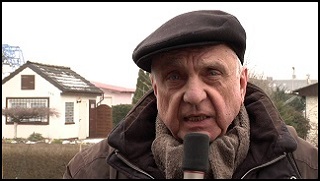
Ralf Thenior (Bad Kudowa, 4 juni 1945)
De Franse schrijfster Marie Ndiaye werd geboren op 4 juni 1967 in Pithiviers. Zie ook alle tags voor Marie Ndiaye op dit blog.
Uit: My Heart Hemmed In (Vertaald door Jordan Stump)
“I back away into the dark living room, self-conscious, convinced I’m being watched. I tug the curtains closed. I’m sweating. I think I saw the rain coming harder now, pounding the windows—I see it, but I can’t hear it, my mind associates it with a familiarsound but I can’t make out that sound, as if the apartment had suddenly been fitted with some sort of impregnable insulation. And I still don’t dare turn on the lamps or spell out the frightening but indistinct thought floating to the surface of my consciousness, pressing me to concede that I have no idea what would happen, what I would see, if I let light fill the living room, where my furniture, my cherished, handsome, expensive furniture, delighted to be deceiving me, might be hiding worrisome strangers, bloodthirsty guardians. That neighbor, I tell myself, might have been sent solely to distract me from what is in fact being fomented right here in my living room, the last place I’d ever suspect. I stand frozen in place. My ear vigilant despite my feeling I’ve been swathed in cotton, I think I hear breathing. Mine? No, someone else’s, it’s coming from further away. I firmly cross my arms to keep my hands from clasping my cheeks and heightening my fear. I very slowly back away toward the bedroom. I thendistinctly hear Ange’s breathing—was that him I was hearing? Was it both of us together?Inside the bedroom, I close the door and pull the little latch. Then, beleaguered, I sit down on the bed as gently as I can, taking care not to wake Ange. But shouldn’t he be stirring anyway? Is it normal, is it healthy to sleep so much? Deep down, I realize, I don’t want to wake him just yet, because I’m not sure I’ll recognize him, I’m afraid he might say strange things to me, I don’t want him seeing me in the near terror the ambiguities of my living room have plunged me into. Little by little I get hold of myself, I begin to fight back at my imagination. Stand up, go into the other room, turn on all the lights, I whisper, and see for yourself that nothing has changed.But I don’t. The heavy darkness surrounds me. Even Ange’s presence seems charged with danger, with unknowable perils. As long as he’s asleep, the menace is quiet. And so, taking pains not to look at him, my own husband, the man I once felt so at one with, I stay perfectly still. I stare at the little latch on the door. I would certainly feel a heartfelt horror if I were to see that little latch move and burst open, succumbing to a mighty force applied from the living room, but I’ve so thoroughly convinced myself it’s going to happen that I’m almost exasperated to see it not happening. At least, I say to myself, at least let me know what or who I’m facing. But even if the door did suddenly burst open, would I know? Would I be capable of understanding whatI saw before me? And would I see anything before me at all? Those questions torment me.”
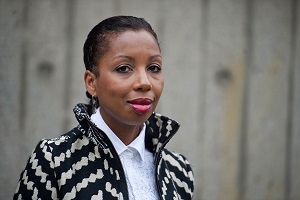
Marie Ndiaye (Pithiviers, 4 juni 1967)
De Duitse schrijver Erasmus Schöfer werd geboren op 4 juni 1931 in Altlandsberg bij Berlijn. Zie ook alle tags voor Erasmus Schöfer op dit blog.
Uit: Sonnenflucht
“Also Viktor, Vik, lieber Freund, ich versuch mal, dir von Sotiria zu erzählen, was du noch nicht weißt. Wird schon klappen mit diesem Ding. Was sollen wir anders machen, wenn die Ärzte mich nicht zu dir lassen. Meiner Mutter hab ich manchmal solche Berichte nach Kreta geschickt, statt Briefen, weil sie nicht gut lesen kann. Ein Radio mit Kassettenspieler hat heut fast jede Familie bei uns. Wird sicher jetzt noch einfacher sein, das Erzählen, wo ich dich wirklich sehe. Also technisch ist es kein Problem, ich meine nur – vielleicht wird alles ein bisschen durcheinandergehn, verstehst du? Aber wenigstens hörst du dann meine Stimme. Eine Art Gruß von draußen an dein Bett.
Es gab ja vieles, aus den letzten Tagen mit Sissu. Zum Beispiel dieser Morgen in Poulithra, eh wir nach Athen zurückgefahren sind. Ich glaube, es war der wichtigste Tag unserer Ferien. Bestimmt der schönste. Fing schon in der Nacht an. Verschlafen hab ich noch im Bett gesessen, im Rücken die kühlen Eisenstäbe, ein Doppelbett, ein altes Bauernbett aus dem vorigen Jahrhundert mit einem Eisengestell wie ein Baldachin für das Moskitonetz, das Kopfende geschmiedet, sehr einfach, vom Dorfschmied, aber schön, gibts heute kaum noch, ich fühl die Stangen an meinen Wirbeln wie gestern, wollte aufwachen. Mein Kopf noch ganz leer, so plötzlich war ich hochgeschreckt, und Sotiria huscht im Zimmer herum, barfuß auf den Dielen, lautlos, hat eine Kerze angezündet, kämmt sich die Haare. Langsam dämmert es mir – Abfahrtstag, ja, Reise, packen, der Bus – aber jetzt schon? Müssen wir wirklich schon los? Wie spät ist es?
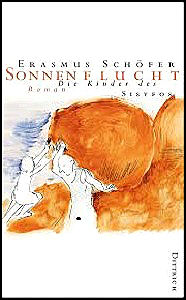
Erasmus Schöfer (Altlandsberg, 4 juni 1931)
Cover
De Amerikaanse (slam) dichter Buddy Wakefield werd geboren op 4 juni 1974 in Shreveport, Louisiana. Zie ook alle tags voor Buddy Wakefield op dit blog.
In Landscape (Fragment)
There is a chance
you will show up laughing
made of fortified fan blades and Ferris wheel lights
true of heart and best foot forward
our long-awaited love made easy,
remember for sure no doubt these things:
The joy,
we are a point of complete.
This life,
standing guard over your solitude.
My eyes
are monsters for most things approaching.
I’m probably gonna need a hand with that.
This heart.
This sleeve.
Neither one of them things is all that clean.
But the rain,
my lucky number,
been doin’ her part to make things right
for the light bulbs
and the bruises.
Hiding holy water was not my forte this life.
Forte
is French
for blanket fort.
I have trusted my corners to revolving doors
but am fluent in getting better.
We are fluent in bouncing back,
lifting quickly,
learning fast.
Our courage
is a natural habitat.
Ya know we’re gonna build a body to keep the wolves out.
Hold my house
you humble barbarian,
this door only opens for the remarkable now.
So we will both show up remarkable.
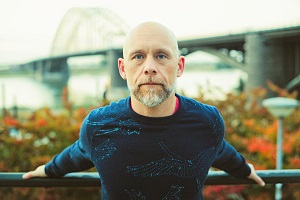
Buddy Wakefield (Shreveport, 4 juni 1974)
De Duitse dichter en schrijver Yaak Karsunke werd geboren op 4 juni 1934 in Berlijn. Zie ook alle tags voor Yaak Karsunke op dit blog.
elderly couple
(after Sebald Beham)
for Ingrid
in an engraving from 1543
as big as the palm of your hand
you see them standing
a woman & a man
not so slim no longer young
the inventors of love
the tapping of the fig tree’s leaves
rubbing against one another
kept Eve awake
& when Adam took the apple he saw
her breasts with new
eyes before his
parting lips
(soon after both were
much moved by knowledge)
the snake darts
out of paradise & glides
smoothly towards you & me –
let’s go into the garden
& adorn
its altar with pomegranates
Vertaald door Nicholas Grindell
berlin encounter
who ist stepping up to me from the twilight?
with half a voice in the half-night
asks the question (extremely inconvinient):
what his state had turned you into?
not so, distorted image, not with this trick
– the victim versus perpetrator net won’t take me here –
don’t keep on lying to yourself any longer!
but my murky shadow protests:
we here in the east, you in the free west,
we’ve now learned what’s trend-setting:
we in the huts, you in the palaces –
but not as far-away as you think.
leave the mirror, brother, I am frightened,
when I discover my image in you.
Vertaald door Marc Falkenberg
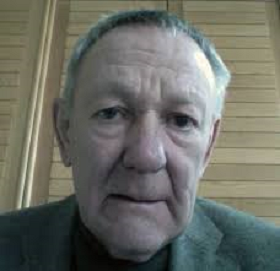
Yaak Karsunke (Berlijn, 4 juni 1934)
De Amerikaanse schrijver Charles Dickinson werd geboren op 4 juni 1951 in Detroit, Michigan. Zie ook alle tags voor Charles Dickinson op dit blog.
Uit: A Family in Time
“In this version, my daughter does not exist. The principal of Euclid Heights High School tells me what I already know: “We have no record of a Penelope Winkler. No birth certificate. No Social Security number. No inoculation records. No grades—at any academic level. If you are able to provide any of that documentation, we will be happy to enroll your daughter.” “Penny was an excellent student,” I say. “At this school. She had friends at this school. She shouldn’t be punished for something I did.” “Mr. Winkler,” the principal says, “we’re all familiar with—” He glances at his colleagues, three men and a woman. “Your story. I personally don’t believe it. But I understand that at this particular time, you’re news. Which makes us—or our decision regarding your purported daughter—news. We’re being watched. We have to follow the rules to the letter.”
“Not that we don’t anyway,” the woman interjects. “Mr. Winkler,” the principal continues, “we base our enrollment decisions on the evidence presented to us.” “She has nowhere else to go,” I say. “Where is Penelope now?” the woman asks. “I’m not sure. She’s mad at me.” “Is she, you know, in this time? Now?” the principal asks.
“Yes,” I nod. At least I think she is. “You could home-school her.” “That would require she come home.” The principal says, “Mr. Winkler. When you…” He pauses and makes a back and forth motion with his hands. I want to be helpful. “Travel through time?” I say. He nods, almost reluctantly. “What happens?” he asks never exactly happens.” The mood is souring. It always does. I stand and ask the principal: “Is there a back door?” A janitor leads me through empty halls. “You’re the time guy,” he says. “You must be cashing in big-time.” I could use some cashing-in schemes. “How?” He thinks for a moment, as short of ideas as I am. “You could endorse a watch or something,” he says, and then switches to his announcer voice. ” ‘When the time guy goes into the future he keeps track of where he is on a Timex whatever.’ “
We reach a door. “This leads west,” he says. “Which way you headed?” “West is good.” “Where to?” “Home,” I say. “Hopefully.” “Really?” He’s disappointed. “You come back when school starts and the kids are here—I’ll pay you to take me back to right now.”
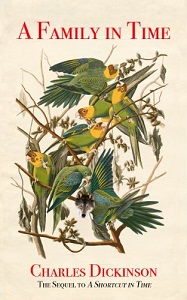
Charles Dickinson (Detroit, 4 juni 1951)
Cover
De Duitse schrijfster Dana Bönisch werd geboren op 4 juni 1982 in Frechen. Zie ook alle tags voor Dana Bönisch op dit blog.
Uit: Rocktage
„Rocktage konnten auch traurig und still sein; vielleicht waren sogar die meisten traurigen und stillen und auch die verzweifelten Tage Rocktage. Auch die Tage, an denen man seinen Job verlor. Oder beim Skaten eine kleine Spitzmaus überfuhr. Und anschließend mit einem Feuerzeug ein Grab für sie buddelte. Und der Tag ein paar Tage später, an dem man von Weitem mitansehen musste, wie sie, die tote Spitzmaus, von einem Hund wieder ausgebuddelt und unwürdigst behandelt wurde. Das alles hinterließ ein unsicheres, schmerzendes Gefühl im Bauch; ein Gefühl, das nachts verdrängt wurde von warmen, unwissenden, sorglosen Sommerträumen, das aber im Land zwischen Traum und Erwachen wieder auftauchte und sich in Pucks Bauch schlich. Dann blieben ihm noch ein paar Sekunden, in denen das schlechte Gefühl nicht definiert war, nur am Rande von Sonnenwelt und Gänsehaut auf Mädchenbeinen existierte. Und dann fiel ihm alles wieder ein. Der ganze. Scheiß. Platschte. Mit Voller. Wucht. Auf. Ihn. Runter, und er wollte nichts als wieder einschlafen, für immer zurück in die Welt, die nicht Leben war. Und meistens stand er dann doch auf. Und begab sich in die andere, die eine, deren Kühlschränke leer waren, und unaufgeräumt und kalt war es, und er war allein. Es gab traurige Musik, Akustikversionen von Radiohead oder etwas in der Richtung. Auch diese Tage waren Rocktage, denn er lebte oder versuchte es zumindest, und von Zeit zu Zeit berührte ihn die Sehnsucht. Schlechte Tage aber waren Tage, an denen man das Leben nicht spüren konnte. Gummispülhandschuhtage.
Puck vergrub die Hände in den Taschen, es war kühl, der Uni-Trampelpfad voller Früh-Frühlingsregenpfützen. »Ich kehre in mich selbst zurück und finde eine Welt«, sagte Johann Wolfgang neben ihm, und Puck sah ihn ungläubig an. In seinen Taschen fand er neben Krümeln, Blättchen und Kaugummipapier einen Flyer. Er sah ihn sich an: Semesteranfangsuniparty, siehstumal. Das hatte er vergessen. Aber er würde auch nicht hingehen. BWLer-Scheiße.
Die Zugvögel kamen wieder und unterhielten sich am Himmel in formierten Schwärmen.“
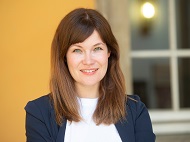
Dana Bönisch (Frechen, 4 juni 1982)
De Australische schrijfster Elizabeth Jolley werd geboren op 4 juni 1923 in Birmingham, Engeland. Zie ook alle tags voor Elizabeth Jolley op dit blog.
Uit: The Newspaper of Claremont Street
“No one knew or cared where the Newspaper of Claremont Street went in her spare time. Newspaper, or Weekly, as she was called by those who knew her, earned her living by cleaning other people’s houses. Every day she was in someone else’s place cleaning. While she worked she sang,
`…the bells of hell go ting a ling a ling for you and not for me…’ She liked hymns best and knew a great many. `Well, and ‘ow are we?’ she called out, arriving with great noise, filling untidy kitchens with her presence, one kitchen after another, for she worked steadily all day, every day, one house after another. She would start by throwing open the windows and, while the sink overflowed with boiling water, she would pull the stove to pieces. She knew everything about the people she cleaned for and she never missed anything that was going on. `Who’s getting married Weekly?’ they asked her, and ‘Who’s moved into the corner house Weekly?’ She told them everything they wanted to know, and when they asked more questions than she would answer, she said, ‘If yo’ know people is living, what else is there to know?’ But she did know other things, deep hidden wishes for possessions and for money to get them; and hidden wishes for possessions and for money to get them; and there were wishes for those things which cannot be bought with money. `I think that word should be clay. C.L.A.Y.’ She leaned over old Mr Kingston’s chair, ‘Let’s see, what was that clue again?’ She read it aloud,
`Universal building material which does not endure forever.
You and yor intelleckshall crorsswords!’ Mr Kingston smiled shyly down at the paper. CLAY, he pencilled in the letters. The word fitted. For some years now Weekly had taken part in one of his few remaining interests. On purpose, he did not finish the puzzle before her arrival. He took pleasure in the discovery that he shared with this uneducated woman a background of long Sunday afternoons devoted to getting by heart passages from the Bible. `Don’t you remember,’ Weekly said, ‘let me see now,’ she looked up at the ceiling, ‘now let me see,’ she muttered to herself, `something like this,’ she said.”
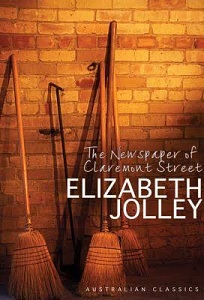
Elizabeth Jolley (4 juni 1923 – 13 februari 2007)
Cover
De Duitse dichteres en schrijfster Frieda Jung werd geboren op 4 juni 1865 in Kiaulkehmen bij Nemmersdorf. Zie ook alle tags voor Frieda Jung op dit blog.
Ohne Liebe
Was wißt ihr, wie es tut
wenn einem die Myrte im Haare ruht,
und die Leute kommen einem entgegen,
und junge Tannen stehn an den Wegen;
die Schwestern gehn überströmten Gesichts, –
vom Turme läuten die Glocken, –
und das Herz weiß von nichts.
O Leben, rühre mich leise an:
ich träume ja noch!
Mein Herz ist voll Licht und Waldesruh,
greif nicht so hart, nicht so eisig zu –
ich träume ja noch!
So aus dem Licht in die Nacht,
aus dem Lenz in den Schnee,
das hat schon manchen blind gemacht,
das tut so weh!
O rühre mit deinem Flügelschlag
mich leise an,
daß erst allmählich in meiner Brust
die zage Hoffnung, das bißchen Lust
verdämmern kann!
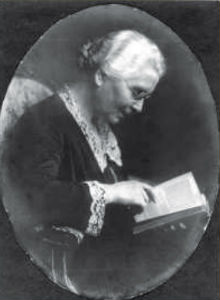
Frieda Jung (4 juni 1865 – 14 december 1929)
Zie voor nog meer schrijvers van de 4e juni ook mijn blog van 4 juni 2018 en ook mijn blog van 4 juni 2017 deel 2.
